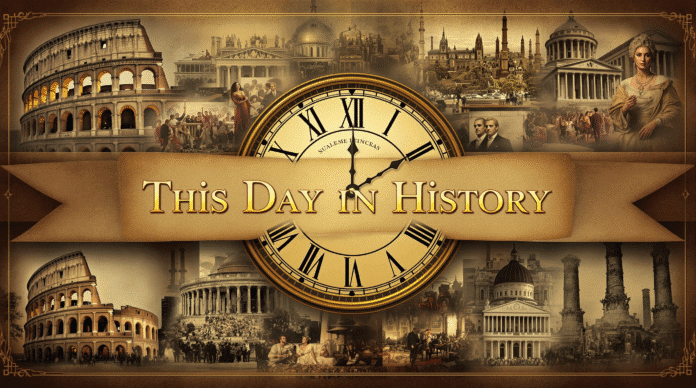May 11, 2025: Pivotal Moments in History
1858 – Minnesota Becomes the 32nd U.S. State
Minnesota officially joined the United States, marking a significant expansion of the nation’s northern territory.
Historical Context
The push for Minnesota’s statehood occurred during a period of rapid westward expansion in the United States. The territory, rich in natural resources like timber and iron ore, attracted settlers and entrepreneurs. The population grew quickly, necessitating a more structured form of governance and representation at the federal level.
Significance
Minnesota’s admission to the Union was significant for several reasons. It solidified U.S. control over the upper Mississippi River Valley and the Great Lakes region. Its abundant resources fueled industrial growth, and its strategic location facilitated trade and transportation. Minnesota also played a crucial role in the Civil War, contributing troops and supplies to the Union cause.
1949 – Siam Changes Its Name to Thailand
The Kingdom of Siam officially changed its name to Thailand, reflecting a shift in national identity and political direction.
Historical Context
The name change occurred in the aftermath of World War II, during a period of political and social upheaval in Southeast Asia. The Siamese government, seeking to distance itself from its past and assert a new identity, adopted the name “Thailand,” which translates to “Land of the Free.” This change also reflected the country’s aspirations for modernization and independence.
Significance
The renaming to Thailand symbolized a break from the past and a commitment to national unity and freedom. It also marked a period of increased engagement with the international community and a focus on economic development. Thailand became a key player in Southeast Asian politics and a founding member of ASEAN.
1985 – Bradford City Stadium Fire
A devastating fire at Valley Parade stadium in Bradford, England, claimed the lives of 56 people during a football match.
Historical Context
The Bradford City stadium fire was one of the worst disasters in British football history. It exposed serious safety deficiencies in stadium design and fire prevention measures. The rapid spread of the fire, fueled by accumulated litter under the wooden stands, highlighted the need for stricter regulations and improved safety standards.
Significance
The tragedy led to significant changes in stadium safety regulations in the UK and around the world. The Popplewell Inquiry, established in the wake of the disaster, recommended a series of measures to prevent similar incidents, including the banning of wooden stands and improved fire detection and suppression systems. The fire serves as a stark reminder of the importance of safety in public venues.
1997 – Deep Blue Defeats Garry Kasparov
IBM’s Deep Blue became the first computer to defeat a reigning world chess champion, Garry Kasparov, in a six-game match.
Historical Context
The match between Deep Blue and Garry Kasparov was a landmark event in the history of artificial intelligence. It pitted the world’s best chess player against a machine capable of analyzing millions of moves per second. The victory of Deep Blue demonstrated the rapid advancements in computing power and AI algorithms.
Significance
Deep Blue’s victory had a profound impact on the field of AI, sparking renewed interest in machine learning and expert systems. It also raised questions about the nature of intelligence and the potential for machines to surpass human capabilities in specific domains. The event marked a turning point in the relationship between humans and computers.
2010 – David Cameron Becomes UK Prime Minister
David Cameron became the Prime Minister of the United Kingdom, leading a coalition government with the Liberal Democrats.
Historical Context
The 2010 UK general election resulted in a hung parliament, with no single party winning a majority. After days of negotiations, the Conservative Party, led by David Cameron, formed a coalition government with the Liberal Democrats, led by Nick Clegg. This marked the first coalition government in the UK since World War II.
Significance
David Cameron’s premiership was marked by significant policy changes, including austerity measures in response to the global financial crisis, the legalization of same-sex marriage, and the referendum on Scottish independence. His government also oversaw the UK’s involvement in international affairs, including military interventions in Libya and Syria.




